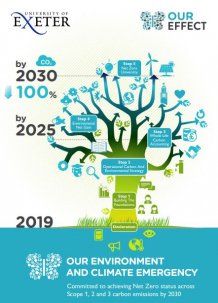
The University has over 1,000 research and education specialists working on the environment and climate.
University of Exeter targets net zero by 2030
The University of Exeter has brought forward its carbon net zero target to 2030.
After declaring an environment and climate emergency in 2019, the University set out a plan to reach net zero before 2050.
But – based on support and input from students and staff – this has been accelerated to 2030.
The ambitious new target covers direct emissions (known as Scope 1 & 2) and – crucially – also includes Scope 3 (all other indirect emissions caused by the University's activities, such as purchases).
"We want to lead the higher education sector in the drive to net zero," said Exeter's Provost Professor Janice Kay, co-chair of the University's Environment and Climate Emergency Board.
"By accelerating our targets to net zero across Scopes 1, 2 and 3 by 2030, we place ourselves amongst a handful of institutions with truly ambitious targets.
"Our sector leadership will be defined by the delivery of these targets."
Professor Kay added: "There has been significant pressure from students and staff to accelerate our carbon targets, to tackle the climate crisis.
"We have listened to those voices, and have created a plan to reach this challenging goal.
"To achieve this, everyone must play their part as individuals, teams and colleges, through action in our offices, labs, buildings, working practices, through learning opportunities and even the way we travel to work and study."
Scope 3 emissions account for 72% of the University's total.
Andy Seaman, the University's Energy Manager, said: "Reducing our Scope 3 emissions requires significant engagement with our supply chain to facilitate a low-carbon economy, alongside transformational changes in our own actions.
"By reducing unnecessary purchases through reuse, efficient operations and product sharing, alongside supporting our supply chain in quantifying and reducing their carbon emissions, we will emerge as sector leaders in Scope 3 decarbonisation."
The University's approach is based on three steps:
- The top priority is reduce – for example, cutting unnecessary purchases and reducing air travel.
- Next is low carbon – meaning low-emission options will be used for necessary activities.
- Finally – when the two options above have been exhausted, the University will use natural offsetting (see below).
Carbon offsetting is a contentious topic in the net-zero discussion.
The University’s approach is to prioritise natural assets that contribute to carbon sequestration as well as improving other areas of natural capital (the benefits of nature), including biodiversity and social wellbeing.
These projects can include creating or restoring forests, peatlands and seagrass.
"Our intention is to prioritise these methods to remove enough carbon from the atmosphere to offset our reduced footprint, before considering carbon sequestration technologies as a final method of carbon offset," Mr Seaman said.
Cutting Scope 1, 2 and 3 emissions is only part of the University's climate action – it is also driving change locally, nationally and worldwide through its cutting-edge research on all aspects of the climate crisis.
The University has over 1,000 research and education specialists working on the environment and climate.
Exeter has the UK’s top five most influential climate scientists – all in the top 21 in the world – and is home to more of the world’s top 100 climate scientists than anywhere else in the world (according to Reuters).
All aspects of Exeter's environment and climate action are included in the University's new Strategy 2030.
To find out more about the mission to reach net zero by 2030, visit https://www.exeter.ac.uk/about/sustainability/ or email climatemergency@exeter.ac.uk
Date: 4 March 2022
